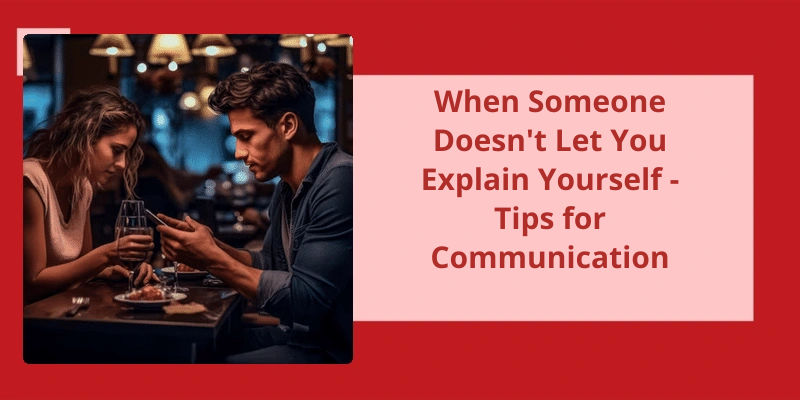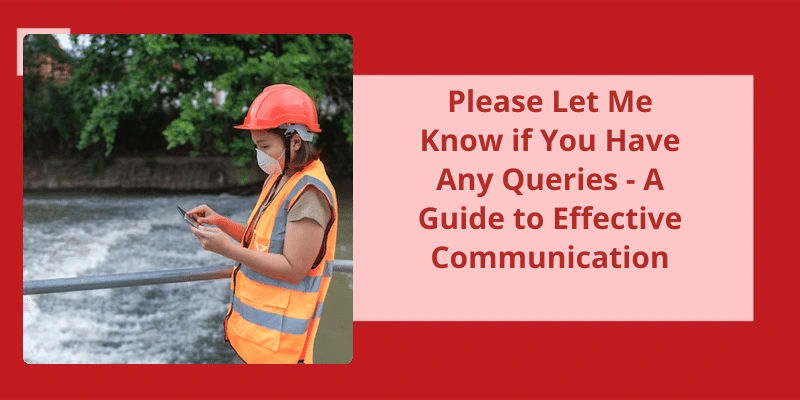Have you ever been in a situation where you were trying to explain yourself, but someone just wouldn't let you? Maybe it was a misunderstanding or a miscommunication, and all you needed was a chance to set the record straight. Perhaps they assumed the worst and didn't give you the benefit of the doubt. Whatever the reason, being unable to express yourself fully can be frustrating, disheartening, and even hurtful. It's important to feel heard and understood, and when someone prevents that, it can create tension and mistrust. So why do some people refuse to let others explain themselves, and how can we navigate these situations with tact and grace? Let's dive into this topic and explore some insights and strategies for when someone doesn't let you explain yourself.
Why Should I Stop Explaining Myself?
Furthermore, over-explaining can be emotionally exhausting and draining. It takes a lot of mental energy to continually justify your actions and thoughts to others. This can lead to feelings of burnout and frustration, as you may feel like you’re never fully understood or accepted. In addition, if you’re constantly defending yourself, it can be difficult to form genuine connections with others, as they may perceive you as defensive or hard to get along with.
Moreover, explaining yourself too often can limit your personal growth and development. By constantly seeking validation and approval from others, you may be less inclined to take risks and make bold choices, as you may fear being judged or misunderstood. This can lead to missed opportunities and a general feeling of being stuck or stagnant in life. By working on accepting yourself and your choices without feeling the need to justify them to others, you can become more confident and capable in your own right.
It’s also important to recognize that not everyone will understand or agree with your choices, and that’s okay. Everyone has their own unique perspective and experiences that shape their beliefs and values. By trying to convince everyone of your own worldview, you may be compromising your own authenticity and living according to someone elses standards. Instead, learn to embrace your own idiosyncrasies and stand firm in your own beliefs, even if they’re different from those around you.
Finally, it’s important to recognize that self-acceptance is key to living a fulfilling and happy life. By constantly explaining and justifying your choices to others, you may inadvertently be seeking validation and approval from outside sources rather than cultivating your own sense of self-worth. This can lead to greater happiness, peace of mind, and personal fulfillment in all areas of your life.
How to Set Boundaries and Assert Yourself Without Feeling the Need to Explain Yourself Constantly.
This article will provide tips on how to confidently set boundaries and assert yourself without feeling the need to constantly explain yourself.
It’s a common habit – we constantly feel the need to explain ourselves to others, even when it isn’t necessary. We worry about being judged or misunderstood, so we over-explain or justify our actions and decisions. But is it really necessary to do so?
Is It OK Not to Explain Yourself?
It’s like were constantly trying to justify our actions to others, even when it’s unnecessary. Maybe it’s because we want to be liked or respected, or maybe it’s because were worried that if we don’t explain ourselves, people will assume the worst of us. Whatever the reason, it’s important to recognize when were doing this and learn to let it go.
It’s OK not to explain yourself because ultimately, you’re the only one who really knows why you do the things you do. Other people can make assumptions or guesses, but they aren’t inside your head and heart. If you’re confident in yourself and your choices, then you don’t need to explain them to anyone. Of course, it’s important to communicate with those around you and be transparent when necessary, but that doesn’t mean you need to constantly justify your actions.
Not explaining yourself can also be a sign of healthy boundaries. When we feel like we’ve to explain ourselves to others all the time, it can be a sign that we aren’t setting clear boundaries around our time, energy, and resources. When we don’t have healthy boundaries, we may feel like we’ve to justify everything we do to avoid upsetting others or disappointing them. But when we’ve clear boundaries, we can confidently say no when we need to without feeling guilty or like we need to explain ourselves.
Finally, not explaining yourself can be a powerful act of self-love and self-acceptance. We may be seeking validation or approval from others instead of trusting ourselves and our own instincts. But when we learn to trust ourselves and accept ourselves fully, we don’t feel the need to constantly explain ourselves to others. We know that we’re doing the best we can with the resources we have, and thats enough.
Whether it’s because you’ve healthy boundaries, are confident in yourself, or simply don’t feel the need to justify your actions, it’s important to recognize when you’re doing this and learn to let it go. By doing so, you can free up mental and emotional energy to focus on the things that truly matter to you.
The Negative Effects of Over-Explaining Oneself
- It can make you appear insecure or defensive.
- It can lead to confusion and misunderstandings.
- It can exhaust your audience and hinder effective communication.
- It can damage your credibility and reputation.
- It can prevent others from making their own conclusions and judgments.
- It can create unnecessary tension and conflict.
- It can waste time and resources.
- It can prevent growth and learning.
Source: Is it healthy to explain yourself to people all the time?..
Communication is a key component in any relationship, but it can sometimes be challenging for individuals to express themselves in a clear and concise manner. Over-explaining oneself is a common behavior that can have negative consequences on the relationship and prevent effective communication. But why do people feel the need to constantly justify their actions, thoughts, or feelings? According to experts, there are several underlying reasons that contribute to this pattern of behavior.
What Does It Mean When You Have to Over Explain Yourself in a Relationship?
This could stem from prior experiences where the individual was met with criticism or rejection when expressing themselves. It could also be a result of low self-esteem and a fear of being misunderstood or not being taken seriously.
Over-explaining oneself in a relationship can also be a sign of insecurity and a need for validation. The individual may feel like they’ve to constantly justify their actions or decisions in order to gain approval from their partner. This can lead to a cycle of seeking reassurance and feeling disappointed when it isn’t given.
It can create a power dynamic where one person holds all the information and the other feels like they’ve to constantly ask for clarification. This can lead to frustration and resentment. It can also prevent the relationship from growing and evolving because both parties are stuck in a pattern of explaining and understanding rather than exploring new ideas and experiences.
Finally, over-explaining can be detrimental to communication in a relationship. It can lead to misunderstandings and misinterpretations because the focus is on the explanation rather than the actual message being conveyed. It can also be exhausting for both parties because it requires a lot of time and energy to constantly explain and clarify.
It’s important for individuals to reflect on why they feel the need to over-explain and to work on building their confidence and assertiveness in expressing themselves. It’s also important for partners to be aware of the dynamic and to actively listen and validate each others perspectives. By having open and honest communication, couples can create a healthy and thriving relationship.
It’s not uncommon to want to explain oneself in great detail to avoid judgment and disappointment. This behavior can stem from a deep-seated need for approval and control over anxiety. In this article, we’ll explore the reasons behind over-explaining, it’s implications, and potential solutions to overcome this tendency.
Why Do I Feel the Need to Over Explain?
In some cases, over-explaining can also be a result of a lack of assertiveness. Individuals who struggle with asserting themselves may feel the need to over-explain to avoid conflict or to ensure that their point is heard and understood. They may fear that others won’t take them seriously if they don’t provide enough information or may fear being viewed as incompetent or unreliable.
People who struggle with anxiety or social anxiety may worry that others won’t understand their intentions or may misinterpret what theyre trying to say. By over-explaining, they hope to clarify their message and ensure that others perceive them in the way they intend.
Now that we’ve identified the ways to stop explaining ourselves, it’s important to understand why this need arises in the first place. Explaining ourselves can come from a lack of confidence, fear of judgment, or a desire to be understood. In this next section, we will delve deeper into the root causes of this behavior and explore ways to address them.
How Do I Stop Feeling the Need to Explain Myself?
One of the most common feelings people face today is the need to explain themselves constantly. From social media to in-person conversations, we all strive to justify our actions to others. However, it’s important to recognize that this habit can become harmful when it starts to affect our mental well-being. It can lead to anxiety, insecurity, and even depression.
One way to stop feeling the need to explain oneself is by understanding that we don’t owe anyone an explanation. We’re entitled to our own choices, opinions, and actions. It’s our personal life, and we’re the only ones who get to decide. Therefore, we don’t need to justify our decisions to others or explain why we did or didnt do something.
It’s crucial to be confident in our choices. Self-doubt leads to seeking the approval of others, which entails endless explanations. To stop feeling the pressure to justify ourselves, we need to believe in our actions. When we’ve faith in ourselves, we won’t require validation from others.
We need to know that we don’t have to please everyone. The truth is that we can’t make everyone happy. We all have different opinions, perspectives, and preferences, and it’s impossible to make everyone agree with us. It’s okay to let people have their own point of view and not let it affect how we feel about ourselves.
Another fundamental thing to recognize is that not everyone will understand us. We need to accept that we’re individuals, and we might think and act differently from others. It’s okay if people don’t understand us as long as we understand ourselves.
Lastly, to stop feeling the need to explain ourselves, we need to be okay with being misunderstood. People might misinterpret our actions or statements, but that doesn’t imply we’ve to explain ourselves every time. It’s okay to leave it as it’s and let people believe what they want. It’s not worth spending our energy and time trying to convince everyone what we meant.
It’s a gradual process, but with continuous practice, we can eventually overcome this habit.
Conclusion
In conclusion, it’s important to understand that communication is the key to any healthy relationship. When someone doesn't let you explain yourself, it can be frustrating and stressful. It can lead to misunderstandings, resentment, and hurt feelings. Therefore, it’s crucial to remain calm and composed in such situations and try to communicate your thoughts and feelings openly and honestly. It’s also important to listen actively to what the other person is saying and try to understand their perspective. Remember, a little empathy and patience can go a long way in resolving conflicts and building stronger relationships. So, next time when someone doesn't let you explain yourself, take a deep breath and remember to communicate effectively.






